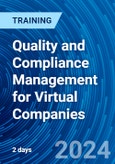Running a pharmaceutical company is not easy, especially if you have an outsourcing model. There are multiple crucial steps for which you need to depend on contract manufacturers and researchers. Additionally, due to the majority of outsourced products, the team may lack quality assurance and GMP compliance.
To evolve from your current expertise and enter Phase 2 and 3 of clinical trials, it is essential to have a strong hold on pharmaceutical GMP compliance. This seminar consists of two days of rigorous training for professionals from virtual companies. You will learn all major requirements and expectations that are applicable to you and your team.
Course Overview
As a virtual company also, it is your responsibility to adhere to the guidelines laid by FDA, EMA, and Health Canada. However, the first step is to diagnose your company’s requirements and pick industry best practices to be followed.
The pharma GMP compliance for virtual companies is not just limited to your own practices. It is essential to choose the right contractors after proper qualification testing and monitoring. In addition to strengthening your brand or business’s value, this training will allow you to grow and expand in the coming months.
Some of the benefits of knowing the prerequisites of GMP audits are:
- Function beyond the outsourcing model
- Choose the right contractors and C-level executives for your business.
- Formulate a top-notch quality agreement.
- Align your internal operations with that of the outsourced.
- Release your product successfully for clinical and market use
- Manage the inspections by responding with the required documents.
8.0 RAC CREDITS
RAPS - This course has been pre-approved by RAPS as eligible for up to 8 credits towards a participant's RAC recertification upon full completion.
Course Content
Course Provider

Ms Kelly Thomas,
Vice President ,
Stallergenes GreerMs. Thomas has over two decades of cGMP hands-on industry experience in both pharmaceutical and medical device manufacturing operations. Her experience covers all Quality Systems; as well as, all areas of validation; including, process/product validation, facilities validation, CSV and 21 CFR Part 11, test method validation, equipment/automated processes and cleaning validation.
Utilizing strategic thinking, risk based approaches, and Lean principles, she has demonstrated success in steering and managing complex projects within the pharmaceutical and medical device industries.
Who Should Attend
This seminar on GMP compliance is typically designed for virtual companies that are going to welcome the commercial growth phase in the coming time. Hence, every professional associated with operations and auditing will benefit from the seminar. They are:
- Quality Managers and Analysts: Gain ideas about managing product quality when the company transitions from an outsourcing model.
- Clinical Operations: Understand the requirements for a clinical product’s approval in the market.
- Document Control Specialists: Learn the requirements of the FDA in terms of documents so that you can present them during the inspection.
- Regulatory Professionals: Supervise the overall function and perform internal audits effectively.









